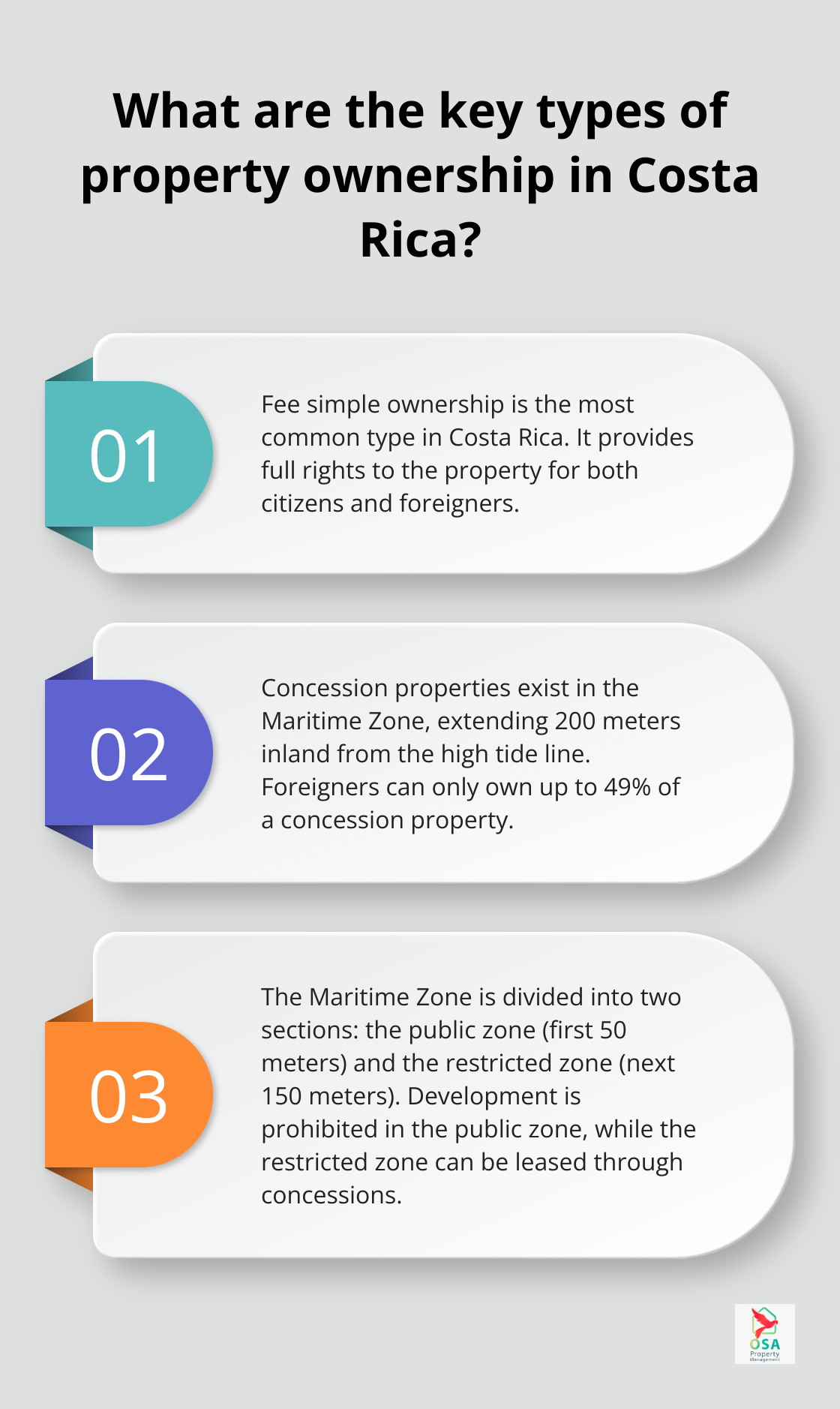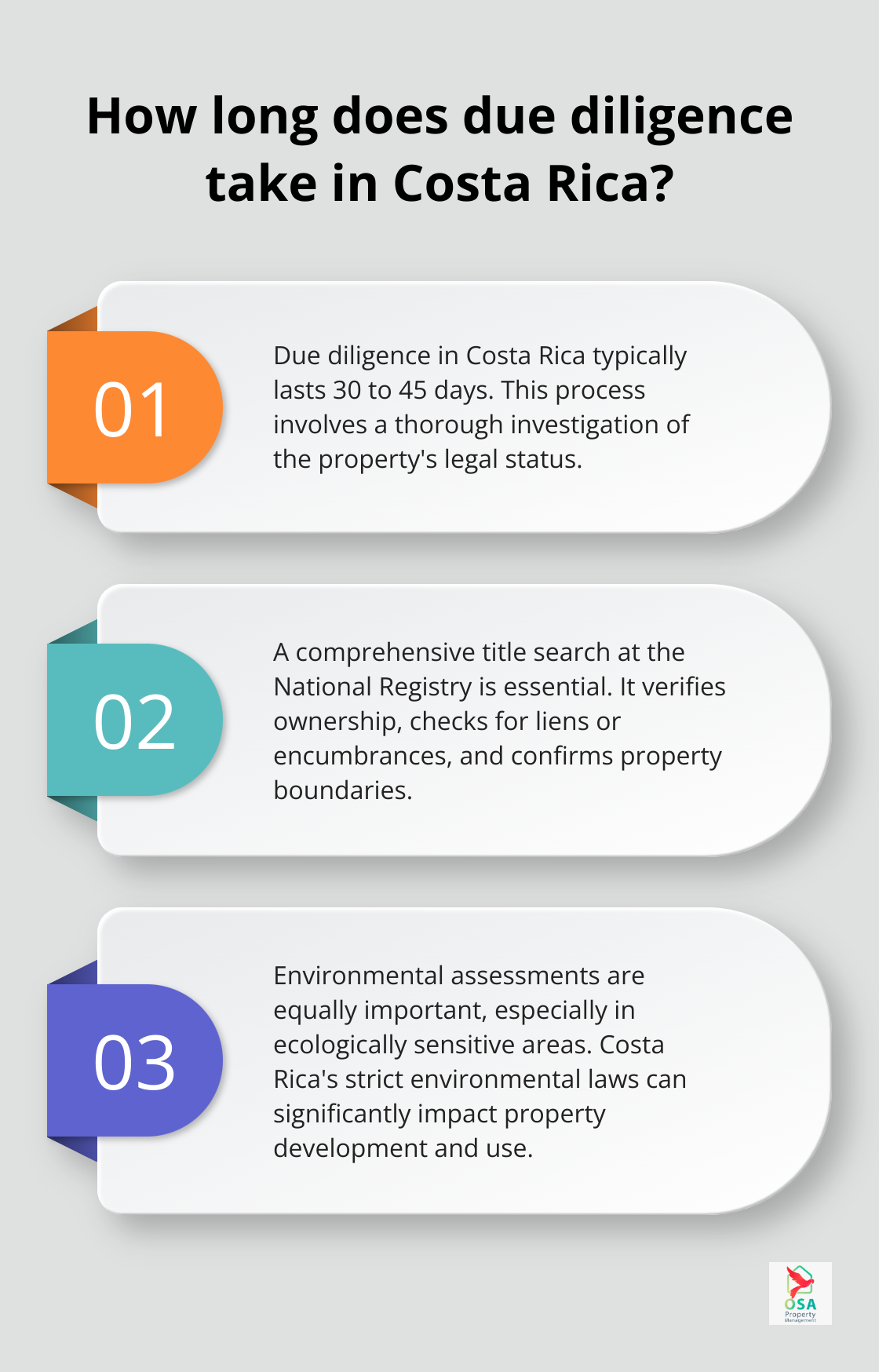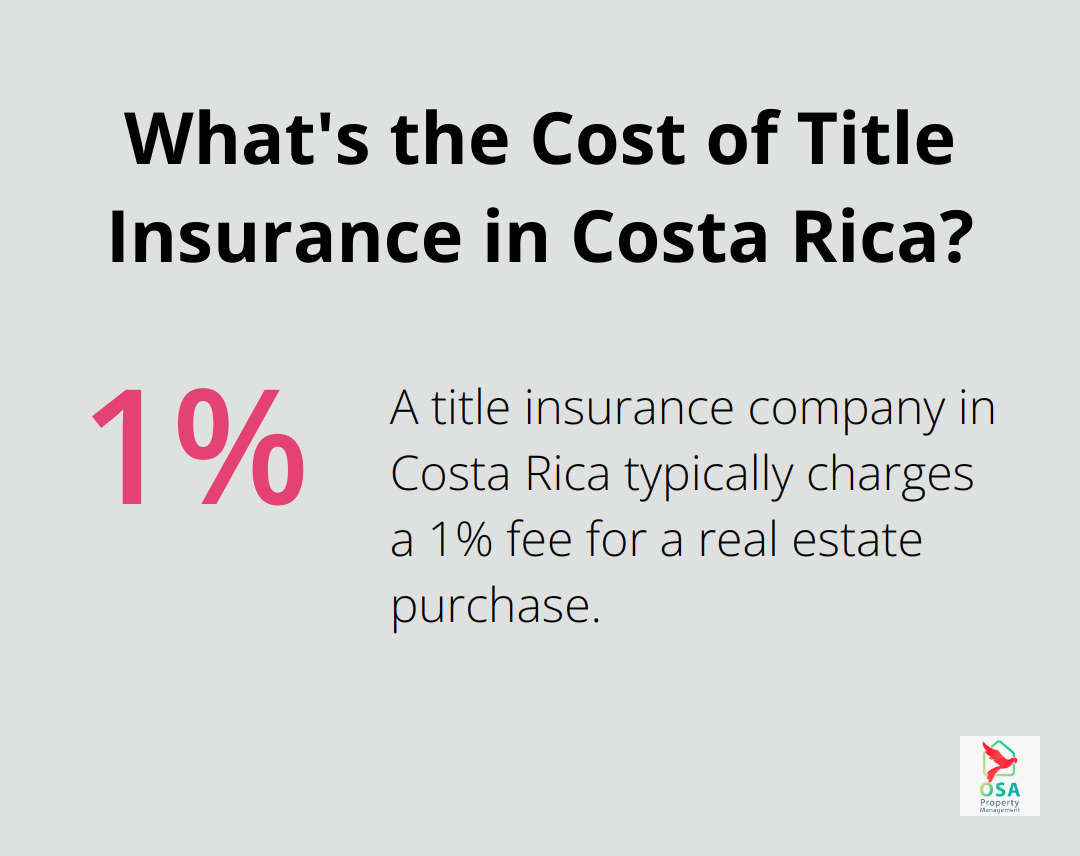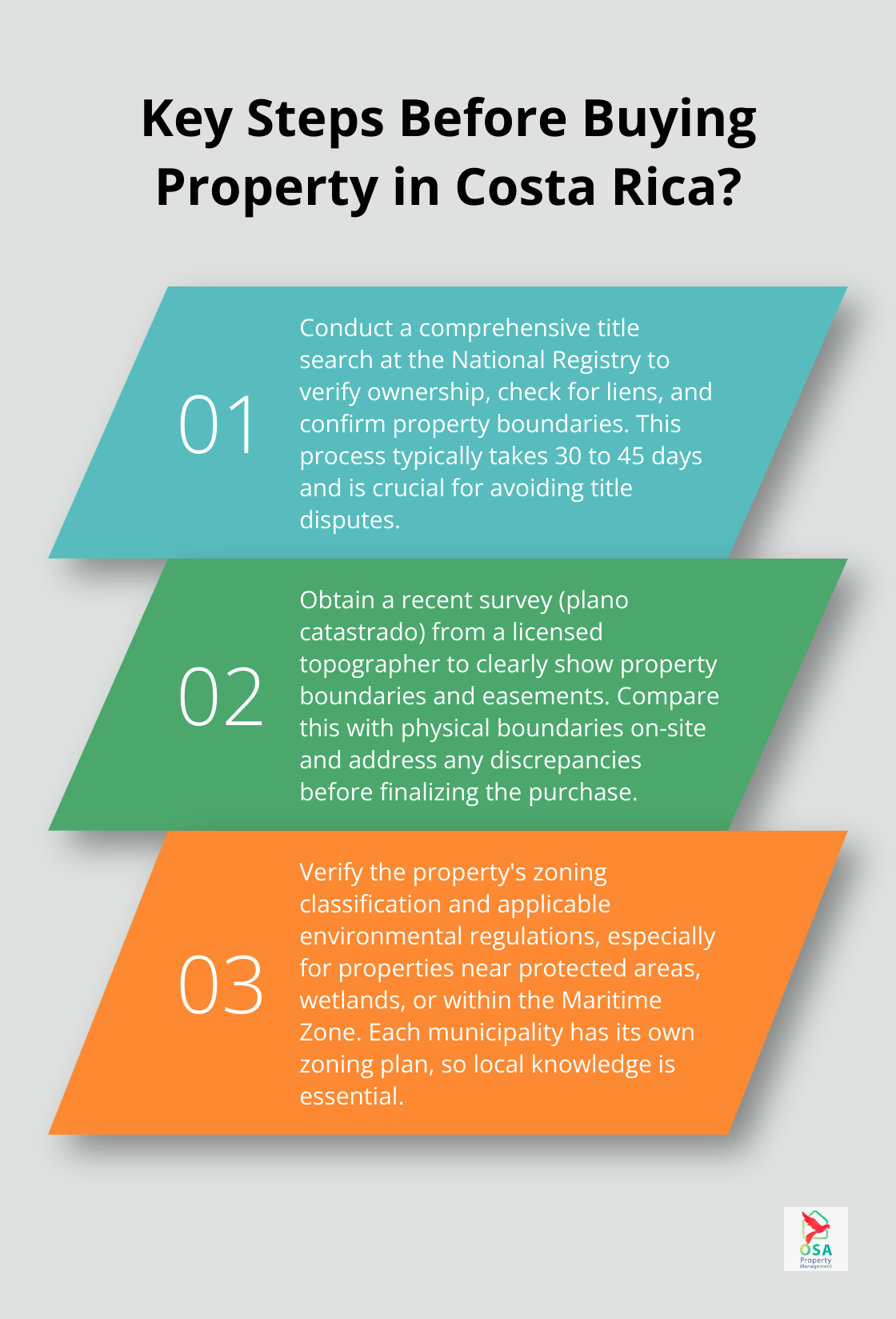Costa Rica’s property ownership laws can be complex, especially for foreigners looking to invest in real estate. At Osa Property Management, we’ve guided countless clients through the intricacies of purchasing property in this tropical paradise.
Understanding the different types of ownership, legal requirements, and potential pitfalls is essential for a smooth and successful transaction. This guide will walk you through the key aspects of Costa Rica property ownership, helping you make informed decisions and avoid common legal issues.
Types of Property Ownership in Costa Rica
Costa Rica offers several types of property ownership, each with its own set of rules and considerations. Understanding these options is essential for anyone looking to invest in Costa Rican real estate.
Fee Simple Ownership
Fee simple ownership represents the most common and straightforward type of property ownership in Costa Rica. It provides the owner with full rights to the property, including the ability to sell, lease, or pass it on to heirs. This type of ownership is available to both Costa Rican citizens and foreigners, who can own titled property in their own name and share the same rights as a Costa Rican citizen.

However, it’s important to note that even with fee simple ownership, restrictions apply to developing properties near the coastline. The Maritime Zone Law prohibits construction within the first 50 meters from the high tide line, and the next 150 meters are subject to strict regulations.
Concession Property
Concession properties typically exist in the Maritime Zone (which extends 200 meters inland from the high tide line). The government technically owns these properties but leases them for periods ranging from 5 to 20 years, with the possibility of renewal.
Obtaining a concession can take several years and requires approval from multiple government agencies. Foreigners face additional restrictions, as they can only own up to 49% of a concession property. Many investors work around this by forming a Costa Rican corporation to hold the concession.
Maritime Zone Property
The Maritime Zone Law states that the first 200 meters, measured horizontally starting at the average high tide line, defines the maritime zone. This zone consists of two sections:
- The public zone (first 50 meters from the high tide line)
- The restricted zone (next 150 meters)
While private ownership or development of the public zone is prohibited, the restricted zone can be leased through concessions.
Properties within the Maritime Zone carry higher risks and limitations compared to fee simple properties. Potential buyers should conduct thorough due diligence and work with experienced local professionals to navigate the complexities of Maritime Zone regulations.
Restrictions on Foreigners Owning Property
While Costa Rica welcomes foreign investment in real estate, certain restrictions apply:
- Foreigners cannot own more than 49% of concession properties in the Maritime Zone.
- Non-residents face limitations on owning properties near international borders (within 50 kilometers).
- Some protected areas and national parks have restrictions on foreign ownership.
Despite these limitations, Costa Rica remains an attractive destination for foreign property investors due to its stable political climate and beautiful natural surroundings.
As we move forward, we’ll explore the legal requirements for purchasing property in Costa Rica, which will help you navigate the complexities of the real estate market in this tropical paradise.
How to Navigate Legal Requirements for Property Purchase in Costa Rica
The Critical Due Diligence Process
The due diligence process forms the foundation of property acquisition in Costa Rica. This process typically lasts 30 to 45 days and involves a thorough investigation of the property’s legal status. A comprehensive title search at the National Registry is essential to verify ownership, check for liens or encumbrances, and confirm property boundaries.

Environmental assessments hold equal importance, especially in ecologically sensitive areas. Costa Rica’s strict environmental laws can significantly impact property development and use. Properties within protected areas or near water sources may have specific restrictions (which your legal team should identify during this process).
The Indispensable Role of a Lawyer
Engaging a reputable, bilingual real estate attorney is a must when purchasing property in Costa Rica. Your lawyer will conduct the title search, review all legal documents, and ensure compliance with local regulations. They will also draft and review the purchase agreement, coordinate with the seller’s representatives, and oversee the closing process.
Clients who work with experienced local attorneys often avoid many common pitfalls and experience smoother transactions. A good lawyer can also advise on tax implications and help structure the purchase to maximize benefits and minimize risks.
Essential Documentation for Property Purchase
Several key documents are required for property transactions in Costa Rica:
- Escritura or Property Deed: A notary public prepares this document to transfer ownership from the seller to the buyer.
- Plano Catastrado: A cadastral survey map that defines the property’s boundaries and measurements.
- Personería Jurídica: If purchasing through a corporation, this document proves the legal status and representation of the company.
- Cédula or Passport: Personal identification for all parties involved in the transaction.
- Permiso Sanitario: A health permit required for properties with septic systems.
The Property Registration Process
Once all documents are in order and funds are transferred, the property registration process begins. This involves:
- A notary public drafts the transfer deed.
- Payment of transfer taxes and registration fees (typically around 3.5% of the property’s registered value).
- Submission of the deed to the National Registry for recording.
- Issuance of a new title in the buyer’s name (usually within 10 to 15 working days).
Throughout this process, your lawyer plays a crucial role in ensuring all steps are completed correctly and efficiently. Proper handling of these legal requirements can make the difference between a smooth property acquisition and a problematic one.
Understanding and navigating these legal requirements is essential for a successful property purchase in Costa Rica. While the process may seem complex, working with experienced professionals can significantly simplify the journey and protect your investment. In the next section, we’ll explore common legal issues that can arise during property transactions and provide strategies to avoid them.
Navigating Legal Pitfalls in Costa Rican Property Transactions
Title Disputes: A Major Concern
Title disputes pose a significant risk in Costa Rican real estate transactions. These issues arise when multiple parties claim ownership of the same property or when undisclosed liens exist. To avoid this problem, conduct a thorough title search through the National Registry. The National Registry also provides a platform to check for any restrictions, easements, or encumbrances on the property.

A reputable attorney can interpret the nuances of Costa Rican property law and identify red flags in title documents. Their expertise proves invaluable in preventing costly legal battles and ensuring a smooth transaction.
Boundary Disputes: A Common Challenge
Encroachments and boundary issues frequently occur in Costa Rica, especially in rural areas with poorly defined property lines. These disputes can lead to expensive legal conflicts and construction delays.
To reduce this risk, obtain a recent survey (plano catastrado) from a licensed topographer. This document should clearly show the property boundaries and any easements. Compare this survey with the physical boundaries on-site and with neighboring properties. Address any discrepancies before finalizing the purchase.
Zoning and Environmental Restrictions
Costa Rica’s commitment to environmental preservation results in strict zoning laws and environmental restrictions. Violations can result in hefty fines or even forced demolition of structures.
Before purchasing, verify the property’s zoning classification and applicable environmental regulations. Pay special attention to properties near protected areas, wetlands, or within the Maritime Zone. Each municipality has its own zoning plan, so local knowledge proves essential.
The Importance of Title Insurance
While not mandatory in Costa Rica, title insurance provides an additional layer of protection against unforeseen legal issues. For very little work, a title insurance company in Costa Rica makes a 1% fee for a real estate purchase. So they earn $5,000 on a $500,000 home sale.
Seeking Local Expertise
Navigating these legal complexities requires local expertise. Work closely with trusted attorneys and real estate professionals who understand the intricacies of Costa Rican property law. Their knowledge can help identify and resolve potential issues before they become major problems.
Taking proactive steps to avoid these common legal pitfalls can significantly reduce the risks associated with property investment in Costa Rica. Prioritize due diligence and seek professional guidance to ensure a successful transaction.
Final Thoughts
Costa Rica property ownership presents unique challenges and opportunities for investors. Understanding the various ownership types, legal requirements, and potential pitfalls will lead to successful investments. Thorough due diligence, including comprehensive title searches and zoning verifications, protects your investment in this tropical paradise.

Local experts play a vital role in navigating Costa Rican real estate transactions. Their knowledge of laws, customs, and market trends proves invaluable throughout the property acquisition process. Osa Property Management offers extensive experience in handling property transactions and management in Costa Rica.
Osa Property Management provides comprehensive services tailored to meet property owners’ specific needs in areas like Tarcoles, Jaco, Dominical, Manuel Antonio, Ojochal, and Uvita. Their team assists with marketing, renter relationships, bill payment, accounting, and tax compliance. Partnering with experienced professionals will help you turn your dream of owning property in Costa Rica into reality.

